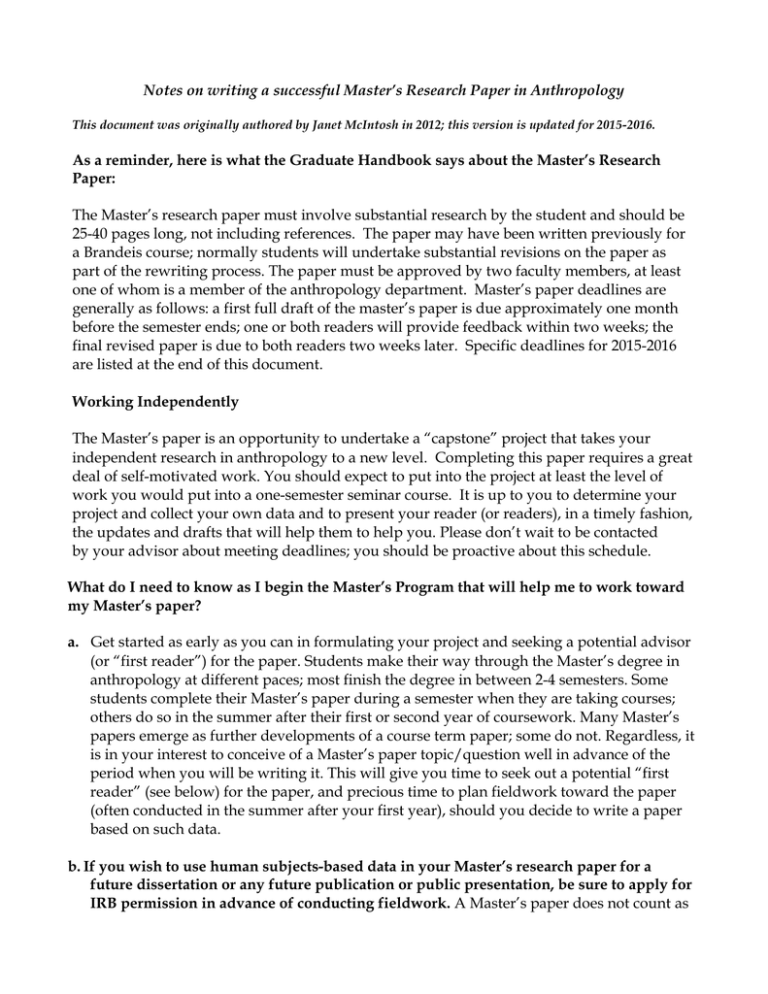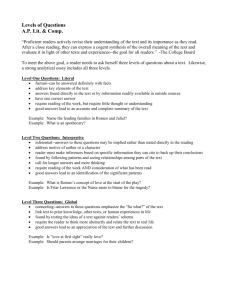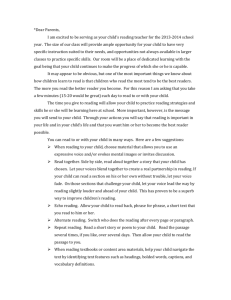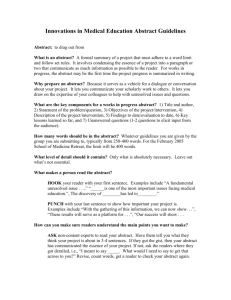Notes on writing a successful Master’s Research Paper in Anthropology
advertisement

Notes on writing a successful Master’s Research Paper in Anthropology This document was originally authored by Janet McIntosh in 2012; this version is updated for 2015-2016. As a reminder, here is what the Graduate Handbook says about the Master’s Research Paper: The Master’s research paper must involve substantial research by the student and should be 25-40 pages long, not including references. The paper may have been written previously for a Brandeis course; normally students will undertake substantial revisions on the paper as part of the rewriting process. The paper must be approved by two faculty members, at least one of whom is a member of the anthropology department. Master’s paper deadlines are generally as follows: a first full draft of the master’s paper is due approximately one month before the semester ends; one or both readers will provide feedback within two weeks; the final revised paper is due to both readers two weeks later. Specific deadlines for 2015-2016 are listed at the end of this document. Working Independently The Master’s paper is an opportunity to undertake a “capstone” project that takes your independent research in anthropology to a new level. Completing this paper requires a great deal of self-motivated work. You should expect to put into the project at least the level of work you would put into a one-semester seminar course. It is up to you to determine your project and collect your own data and to present your reader (or readers), in a timely fashion, the updates and drafts that will help them to help you. Please don’t wait to be contacted by your advisor about meeting deadlines; you should be proactive about this schedule. What do I need to know as I begin the Master’s Program that will help me to work toward my Master’s paper? a. Get started as early as you can in formulating your project and seeking a potential advisor (or “first reader”) for the paper. Students make their way through the Master’s degree in anthropology at different paces; most finish the degree in between 2-4 semesters. Some students complete their Master’s paper during a semester when they are taking courses; others do so in the summer after their first or second year of coursework. Many Master’s papers emerge as further developments of a course term paper; some do not. Regardless, it is in your interest to conceive of a Master’s paper topic/question well in advance of the period when you will be writing it. This will give you time to seek out a potential “first reader” (see below) for the paper, and precious time to plan fieldwork toward the paper (often conducted in the summer after your first year), should you decide to write a paper based on such data. b. If you wish to use human subjects-based data in your Master’s research paper for a future dissertation or any future publication or public presentation, be sure to apply for IRB permission in advance of conducting fieldwork. A Master’s paper does not count as Notes on Writing a Successful Master’s Research Paper in Anthropology a “public document,” so technically the research described in it need not be approved by the IRB (Institutional Review Board). However, if you anticipate revising your Master’s paper for publication, or using your data in a future public document or presentation such as a doctoral dissertation or conference paper, AND if your data collection involves research with human subjects (such as interviewing or participant observation), then you need to apply for and receive IRB permission in advance of conducting the research. It is not possible to get IRB approval retrospectively. You should submit your application as soon as possible, since it can take 1-2 months to complete the process and the board not infrequently asks students for revisions. You can find detailed IRB information and instructions on the Anthropology Department website (click on Graduate Programs and then Human Subjects Information, or go directly to: http://www.brandeis.edu/departments/anthro/HumanSubjects.html). One of our faculty members, Jonathan Anjaria, serves on the Brandeis’ IRB board, and he welcomes questions from our graduate students about the process and their proposals (janjaria@brandeis.edu). Feel free also to contact the IRB administrator with queries (irb@brandeis.edu). c. If you opt to conduct original fieldwork toward your Master’s paper, remember that you can apply for fieldwork/travel funding. Possible funding sources include anthropology department grants, GSAS master’s research grants, GSA travel grants, Jane’s Travel Grants, and funds from Women and Gender Studies. Within the Anthropology department, there are two rounds of application deadlines for department-internal “GTR” funds; one in fall semester (typically, to support research over winter break) and one in spring (typically, to support research over the summer). Master’s students sometimes apply for these funds to support their fieldwork, and we try to support as many wellconceived projects as we can, to the best of our abilities (contingent upon our budget in any given semester). I need two readers for my Master’s paper. How do I find them? Your first reader for the Master’s paper assumes the role of primary advisor for this project. The best first reader for a given Master’s paper is usually the professor best intellectually matched to the project, all other things being equal (e.g., equitable distribution of Master’s paper advisees across professors). This may or may not be your primary academic advisor in the department; often it is a professor who has taught you in the class that most closely inspires your Master’s paper. Ultimately, the Master’s paper needs to be approved by a first and a second reader. Second readers can be drawn from faculty outside of the anthropology department. Sometimes a student may have a second reader in mind; if not, they can work with their first reader to generate ideas for a second reader. The student should certainly approach the second reader about the possibility of their reading a draft or drafts according to the standard timelines listed above, but the second reader is under no obligation to accept that responsibility (some will be very keen to give early feedback; others may simply not have the time). 2 Notes on Writing a Successful Master’s Research Paper in Anthropology Finding your Data, Motivating Your Thesis, Crafting a Well-Written Paper Your Master’s research paper can be based upon your original research in the field, upon data gathered from other sources (say, videotaped footage; political speeches; internet chatrooms; archival or museum material), and/or upon existing theoretical and ethnographic literature. A fieldwork-based Master’s paper has certain advantages. Fieldwork is of course the foundation of anthropology, so conducting original fieldwork gives you a chance to flex these muscles, and (if need be) to test the waters to determine whether you think a future in anthropology is for you. It is also wonderful to have a fieldwork-based writing sample when applying for doctoral programs, or, minimally, to be able to summarize one’s fieldworkbased project in one’s applications. However, fieldwork is not a must for an M.A. paper, and plenty of strong papers have been grounded in other material instead. No matter where your data comes from, your Master’s paper must emerge from questions that are motivated; questions that feel like they need to be asked. Ideally, your introduction will set up your thesis statement (that is, your statement of your central argument) with a context that shows how your thesis stems from a tension, question, or puzzle in your data or the anthropological literature or both. Rather than simply stating “I’m interested in X and Y,” you must set up the problematic from which your (clearly stated) argument emerges. It is sometimes helpful to formulate a “why” question that your thesis will attempt to answer, or at least illuminate. For example, “Why does a critical mass of finance executives abandon their comfortable lives for a week every year to participate in the Burning Man Festival?”, “Why, in the society under consideration, are young women much more likely than older ones to be accused of practicing witchcraft?”, “Why did empire X collapse under this particular set of conditions, while empire Y, seemingly under the same conditions, flourished?” “How” questions can also be fruitful. For instance: “How do Hawaiians sustain the notion that certain culinary and ritual practices are ‘traditional’ even when they are actively engaged in the process of altering them?”, “How do members of society X—who have historically tended to espouse context-dependent models of the person—react to, assimilate, and question the essentialist models of the person in Facebook personality quizzes?” or “How do the power dynamics between coaches and players manifest themselves even in seemingly casual and friendly conversations?” Your motivating queries may, of course, be more detailed and nuanced than these. Regardless, having an interesting question or puzzle—a “motive”—built into your introduction helps you and your reader feel the urgency or importance of your argument. If you wonder what kinds of argumentative gambits are available to you more generally, the following (excellent) guide from Harvard’s Writing Program has a useful summary of common types of arguments in anthropological papers—see p. 25: http://isites.harvard.edu/fs/docs/icb.topic235750.files/anthropology_writing_guide_2010. pdf 3 Notes on Writing a Successful Master’s Research Paper in Anthropology The same guide is also richly laden with suggestions about how to engage with anthropological literature/sources. We recommend as well reading the annotated student essay at the end. Engaging with Anthropological Literature and Ideas Since this is a Master's program in anthropology (or in anthropology & women’s and gender studies), your Master’s paper must engage meaningfully with the anthropological literature on the subject matter, and should demonstrate proficiency in that literature. Drawing on the insights of other disciplines can enrich the work, but the paper must be anthropological at its core. Thoroughly review the salient anthropological and scholarly literature on your topic, in consultation with faculty members and library staff. Be sure to search through the various databases, including AnthroSource, Anthropological Abstracts, Anthropology Plus, JSTOR, Academic Search Premier, and so forth. It doesn’t hurt to run relevant terms through Google Scholar (the "cited by" function, which displays other works that have cited a given article or book, can be particularly useful). We encourage you as well to attend library workshops on research and on citation software. Your Master’s paper should show signs that certain core lessons of anthropology have been internalized. A sociocultural anthropology Master’s paper should, for instance, reflect your understanding that the normally taken-for-granted conceptual categories of modern western societies are themselves subject to critical examination, and that anthropologists tend to try to understand the internal logic of cultural practices. An archaeology paper should also reflect such approaches, and should be about the people behind the potsherds, buildings, and other objects. It should question the how and why of patterns of material culture, striving to understand the cultural contexts and natural processes that produced the archaeological data. Whether or not your paper directly addresses a non-western case, it may be strengthened by the comparative, cross-cultural perspective associated with anthropology. For example, a Master’s paper concerned with modern American conceptions of pets might benefit from thoughtful engagement with anthropological work on totemism and animal symbolism in a range of non-western societies. A paper on archaic states might benefit from a comparative review of the role of kinship in segmentary and unitary forms of socio-political organization. That said, while the comparative literature should inform the paper, it might not need to be written about at length. This depends on your project, and should be discussed with your reader(s). Writing about Methodology A successful paper should have a (brief) methodology section that not only explains the methods used, but also justifies them. If, for example, your data comes from written surveys 4 Notes on Writing a Successful Master’s Research Paper in Anthropology rather than ethnography, this choice requires some explanation. If your fieldwork was constrained by logistical or social considerations, these should be explained. If you chose to focus on a particular subgroup, this choice requires some background. You should also indicate your awareness of the potential pitfalls and limitations of your chosen methods. Your methodology section often appears in your introductory section, but in some instances, methodological issues may be addressed in an appendix. If you used surveys or an interview guide, for instance, those usually are placed in an appendix. Depending on how well this serves your argumentative purposes, you may also wish to include a reflexive section, clarifying your own relationship to the topic in question. Are you studying a tradition or community that you count yourself a part of? Did you begin this project with a strong draw towards, or anxiety about, the social group in question? Why? Titling the Paper Even your paper draft(s) should have a working title, to organize the sense of argument for yourself and your readers. Your title should be precise; rather than merely gesturing at a topic (“Gender among Boston Construction Workers,” or “Globalization and Childbirth in Tibet”), it should give the reader a more precise hint of your argument or your theoretical focus (e.g. “Rebuilding Gender: Practices of Self-Fashioning among Boston Construction Workers,” “Cutting Cords: Global Anxieties and Contested Midwifery in Cosmopolitan Tibet”). In the case of a sociocultural paper, it is at times helpful for the first part of the title to incorporate an especially evocative quote by one of your informants—a quote that foreshadows the central concerns of the thesis. Final Tips on Writing Well • • • • • Consider opening your paper with a detail—a vignette or a quotation, for example— that encapsulates some of the key issues or puzzles that you will dig into in the paper. This helps to hook your reader’s attention more than broad generalizations do. Remember that the introductory paragraphs must motivate your argument, provide a sufficiently detailed thesis statement (this can be 2 sentences or even longer, if need be), and proffer the necessary context to situate your argument. Your paper must have enough summary of the relevant literature, and explicit definition of key concepts, that a well-educated generalist would be able to follow it. Do not assume, in other words, that your reader is highly familiar with anthropological literature. When you do summarize, be sure the summary is clearly articulated and signposted in service of your argument. You should control the summary for your purposes, rather than being controlled by and getting lost in your sources, in other words. Use the beginnings of paragraphs to transition from one point to another, placing a stitch between the preceding paragraph and the point to come. Often the start of a paragraph is also a good place to signpost back to the thesis, so as to re-orient the reader, and to make explicit how the logic of your argument is unfolding. (This gambit 5 Notes on Writing a Successful Master’s Research Paper in Anthropology • • • • • • can help to avoid the “laundry list” paper structure, where points seem to arrive in no particular order.) Use the ends of paragraphs to hammer home the central point of the paragraph, if it is not already obvious. As you re-read your draft, make sure every paragraph has a clear center of gravity. Assume a fairly inattentive reader, who requires frequent signposting to the key terms/key concepts in the thesis so as to be reminded of where the writer is taking the reader, and why. Assume a fairly impatient reader, who will be irritated and distracted by grammatical solecisms and spelling errors. Have someone—or even two people—proofread your paper. Please cite sources and format references competently and professionally--see below for helpful websites. Read your paper out loud to yourself to catch run-on sentences and awkward constructions. Paginate your drafts and final version before submitting to your reader(s). Here is the webpage from Brandeis’ Writing Center, describing the resources available to Graduate Students. Graduate-level consultants can work with you on a variety of needs: http://www.brandeis.edu/writingprogram/writingcenter/grad.html Here is the American Anthropological Association’s Style Guide, including reference examples: http://www.aaanet.org/publications/style_guide.pdf And here is the Chicago Manual of Style, which is used by the AAA: http://www.chicagomanualofstyle.org/home.html The Nuts and Bolts of Submission and Approval • • • One month before the registrar’s deadline to file an application for your graduate degree for the semester in which you seek to graduate, please fill out the "Master’s Paper Plans" form, available from Laurel Carpenter's office. This form requires that you list a provisional title, four or five lines describing your likely topic/argument, and the names of your first and second readers. Your first reader will need to sign this form before it is submitted to Laurel Carpenter. Check in with your second reader about whether or not they will have time to offer feedback on a draft of your paper. As noted above, such feedback can be helpful, but it is not strictly required from second readers. Check in with your readers about the medium they prefer for draft and final paper submission. Some may be happy with email submissions; others may require printed copies in their mailbox. Be sure you know what they want in advance so that you are able to get printed versions to readers who require them in a timely fashion. 6 Notes on Writing a Successful Master’s Research Paper in Anthropology • • • • If you are hoping to finish your Master's paper over the summer, it is especially important to check in with your readers well in advance about availability. When both readers have approved the paper they will let you and Laurel Carpenter know, most typically by email. The readers themselves then fill out and sign a form that goes into your record to indicate your Master’s paper has been approved. You do not need to procure or sign this form, unless you are a joint WGS and Anthropology student (WGS has its own administrative process). Email signatures can be accepted in lieu of paper signatures. A copy of the approved version of your master’s paper must be submitted to the department. If your readers find that your final version of the Master’s paper does not yet meet the requirements, you will be asked to make further revisions, and may need to delay your graduation date. Master’s degree deadlines 2015-2016 For a Feb 2016 degree (work is completed by the end of the Fall 2015 semester) Thursday, October 1 Deadline to file “Master’s Paper Plans” with the department [provisional paper title, short description, and the names of your two readers] Sunday, November 1 Deadline for registrar’s on-line application for a master’s degree Monday, November 2 First full draft of master’s paper is due to one or both readers Monday, November 23 Faculty comments on master’s papers due to degree candidates Friday, December 18 Final, revised version of master’s paper due to both readers [last day of Finals Week] For a May 2016 degree (MA paper is completed prior to the start of final exams) Deadline to file “Master’s Paper Plans” with the department Monday, Feb 1 [provisional paper title, short description, and the names of your two readers] Tuesday, March 1 Deadline to file the registrar’s application for a master’s degree First full draft of master’s paper is due to one or both readers Wednesday, March 2 Wednesday, March 23 Faculty comments on master’s papers due to degree candidates Monday, May 2 Final, revised version of master’s paper due to both readers [This is the last day of instruction, prior to the start of final exams. Note deadlines are tighter due to May commencement and the lead time required to prepare diplomas.] For an August 2016 degree (contingent on readers; work is completed in early August) Monday, May 16 Deadline to file “Master’s Paper Plans” with the department [provisional paper title, short description, and the names of your two readers] Friday, June 10 Deadline to file the registrar’s application for a master’s degree Thursday, June 30 First full draft of master’s paper is due to one or both readers Friday, July 15 Faculty comments on master’s papers due to degree candidates Monday, August 1 Final, revised version of master’s paper due to both readers. 7




